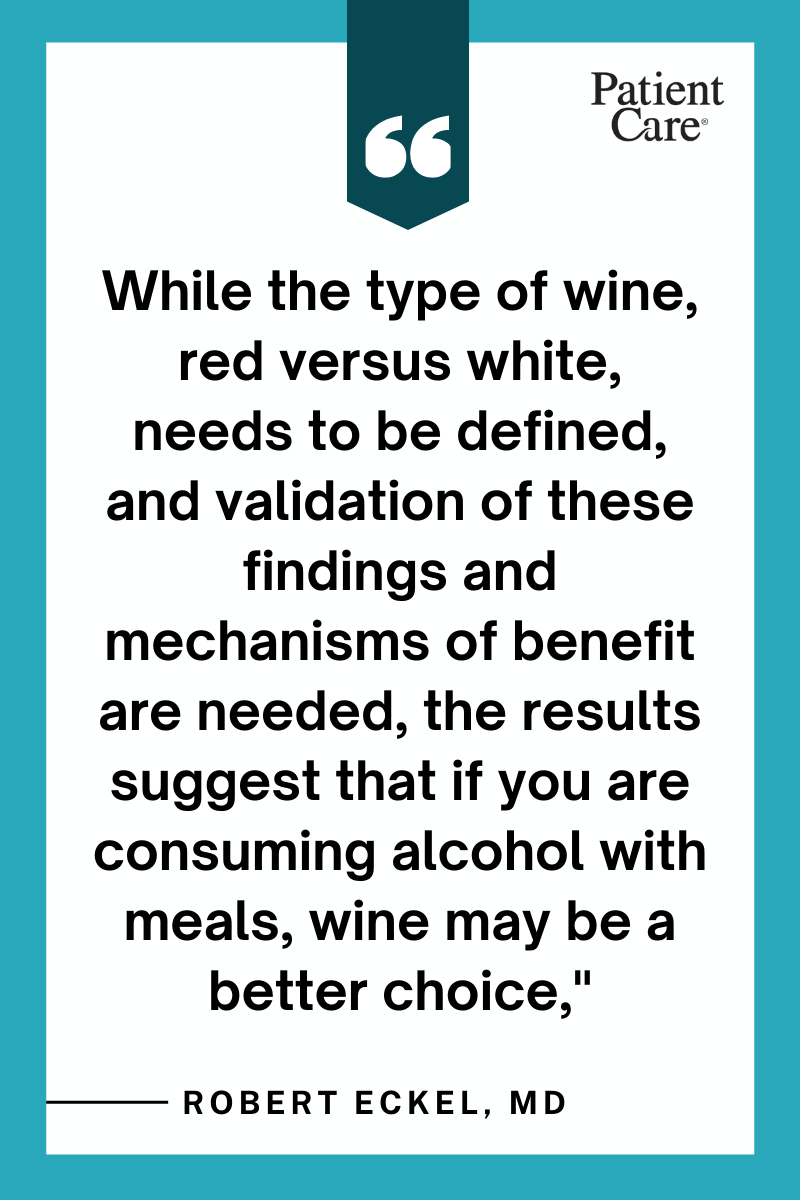- Clinical Technology
- Adult Immunization
- Hepatology
- Pediatric Immunization
- Screening
- Psychiatry
- Allergy
- Women's Health
- Cardiology
- Pediatrics
- Dermatology
- Endocrinology
- Pain Management
- Gastroenterology
- Infectious Disease
- Obesity Medicine
- Rheumatology
- Nephrology
- Neurology
- Pulmonology
Moderate Wine Intake with Food May Help Decrease T2D Risk in Adults
Moderate consumption of alcohol with food was significantly associated with a 14% lower risk of type 2 diabetes in a preliminary analysis.
©abolkis/AdobeStock

Moderate intake of alcohol, particularly wine, with meals was associated with reduced risk for type 2 diabetes mellitus (T2D), according to a preliminary analysis of more than 312 000 current drinkers.
The findings were presented at the American Heart Association’s (AHA) Epidemiology, Prevention, Lifestyle & Cardiometabolic Scientific Sessions, held between March 1-4, 2022.
“The effects of alcohol consumption on health have been described as a double-edged sword because of its apparent abilities to cut deeply in either direction – harmful or helpful, depending on how it is consumed,” said study author Hao Ma, MD, PhD, biostatistical analyst, Tulane University Obesity Research Center, New Orleans, LA, in an AHA press release. “Previous studies have focused on how much people drink and have had mixed results. Very few studies have focused on other drinking details, such as the timing of alcohol intake.”
Ma and colleagues aimed to examine the association between the timing of alcohol consumption with respect to meals and the risk of incident T2D. Researchers reviewed data for 312 388 adults from the UK Biobank cohort who classified themselves as regular alcohol drinkers and were free of T2D, cardiovascular diseases, and cancer at baseline.
The average age of participants was 56 years, over 50% were women and 95% were White, according to the press release.

During 10.9 years of follow-up, investigators documented 8598 incident cases of T2D. Drinking alcohol with meals was significantly associated with a 14% lower risk of T2D compared to consuming alcohol without meals, according to Ma and colleagues.
Investigators emphasized that the potential benefit of moderate drinking—defined by the US Centers for Disease Control and Prevention as 1 serving (14 g) per day for women and 2 servings (28 g) a day for men—was only apparent among adults who consumed alcohol during meals, however the specific time of meals was not collected for the analysis. The beneficial relationship between alcohol intake with meals and T2D was most common among adults who drank wine vs those who drank other types of alcohol. In fact, Ma et al found that consumption of a higher amount of beer or liquor was associated with a hither risk of T2D.
“The message from this study is that drinking moderate amounts of wine with meals may prevent type 2 diabetes if you do not have another health condition that may be negatively affected by moderate alcohol consumption and in consultation with your doctor,” said Ma.
One study limitation was the fact that most of the participants were self-reported White adults and of European descent, so it is unknown whether these results can be generalized to other populations.
The association between alcohol and new-onset T2D is still controversial, noted Robert Eckel, MD, past president of the AHA who was not involved in the study, in the AHA press release.
“These data suggest that it’s not the alcohol with meals but other ingredients in wine, perhaps antioxidants, that may be the factor in potentially reducing new-onset type 2 diabetes. While the type of wine, red versus white, needs to be defined, and validation of these findings and mechanisms of benefit are needed, the results suggest that if you are consuming alcohol with meals, wine may be a better choice,” stated Eckel, professor of medicine emeritus, Division of Endocrinology, Metabolism, and Diabetes, Division of Cardiology, University of Colorado Anschutz Medical Campus.
Obesity Linked to Faster Alzheimer Disease Progression in Longitudinal Blood Biomarker Analysis
December 2nd 2025Biomarker trajectories over 5 years in study participants with AD show steeper rises in pTau217, NfL, and amyloid burden among those with obesity, highlighting risk factor relevance.
